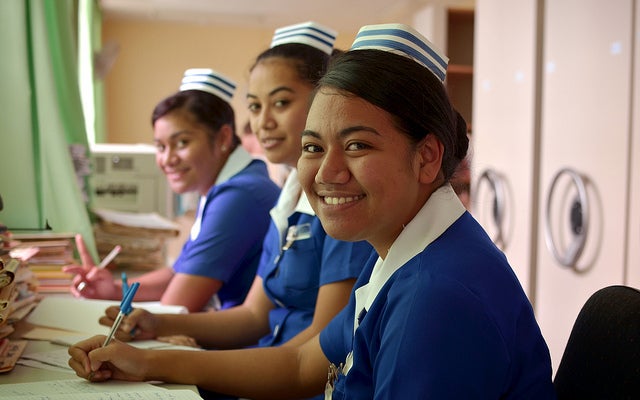
In the sustainable development goals (SDGs) era, the imperative to finance the development agenda from domestic resources has been amplified. Irrespective of a government’s best intentions to achieve universal health coverage (UHC), without adequate financing from its national budget, minimal progress will be made. This is in stark contrast to the Millennium Development Goals (MDGs) era (from 2000- 2015) where emphasis was on effective development cooperation (EDC). And when it comes to achieving UHC, financing is actually only part of the role ministries of finance can play. Indeed, in a recent Lancet article, H.E Taro Aso, Deputy Prime Minister and Finance Minister of Japan, pointed out that the finance ministry’s “crucial role in Japan’s UHC achievement has not been adequately highlighted”.
The vision of UHC is that all people can obtain the quality health services they need without suffering financial hardship. And as such, achieving universal health coverage is critical for countries to make the most of their strongest asset: human capital. Health is a foundational investment in human capital and in economic growth--without good health, children are unable to go to school and adults are unable to go to work.
Yet still, half the world's population cannot access basic health services, while 100 million people are pushed into extreme poverty each year because of health expenses, shows WBG/World Health Organization (WHO) research from 2017. In addition, 800 million people spend at least 10 percent or more of their household budget on healthcare expenses, often forcing them to choose between their health and other necessities for their family.
The design, rollout and the expansion path towards achieving UHC in countries require a thorough analysis. The economic cost, pricing and financing scenarios are usually guided by macro- fiscal assumptions on public expenditure, revenue, gross domestic product (GDP) growth, and inflation and exchange rates. These assumptions can be adequately accounted for in the design of essential packages, and their expansion if finance ministries are involved in such decisions from start. Without this, the sustainability of UHC financing cannot be guaranteed.
Furthermore, the implementation of UHC is an essential part of the social contract between populations and the State. Determining the sources of revenue, administering revenue collection and allocating such revenues raised are all key ministry of finance responsibilities. As a result, any decision to generate additional revenue through increasing tax rates, or initiating sin taxes, soft or hard earmarking to finance or expand UHC implementation is a significant fiscal decision in that such a decision may not only require appropriate legislative approval in most countries, it will also require incremental or new administrative processes and systems to mobilize and track the funds from such sources effectively. As the fiscal agent of the government, the ministry of finance will play a lead role in such decisions.
And with increased financing comes increased demand from finance ministries for accountability and transparency in the use of funds. This will require setting clear results expectations, and a continuing dialogue between finance and health ministries on how the health investment is yielding returns. Health ministries should therefore be willing to accommodate a nagging ministry of finance that is ever more demanding for better health sector governance and accountability! Yet, finance ministries are also suppliers of governance and accountability mechanisms. Since UHC provides a social safety net to the population – especially those in hard-to-reach areas, vulnerable and low- income earners - shaping mechanisms that strengthen transparency, trust and accountability for the use of funds for UHC should be a joint venture between finance and health ministries.
Although a legacy of the MDGs, DAH is still needed in the SDGs era but needs to evolve to a catalytic role. From about USD10 billion in 2000, DAH grew to a peak of USD38 billion in 2013. Since then, DAH has stagnated and represented USD 37.6 billion in 2016. The majority of DAH focused on specific diseases or health programs, reflective of three of the six MDGs targeting specific health outcomes of which many countries made substantial progress in improving health outcomes. However, in the SDGs era, instead of being the primary funding source for health, DAH should rather leverage a bigger pie of domestic resources for UHC, and support the strengthening of country systems for health service delivery to ensure sustainability of results as many countries transition from aid to using financing the UHC agenda from domestic resources. The International Partnership for Universal Health Coverage 2030 (UHC2030), the successor of the International Health Partnership (IHP+) can play a leading role in shaping this shift globally.
Financing transition and sustainability decisions in the health sector should not be a donor driven agenda. Both finance and health ministries need to work jointly with donors to navigate this. While every country’s path to UHC will be different, many can agree on a common point: ministries of finance could be a catalyzing force for good to the UHC agenda anywhere.
Join us, Friday, April 20: Towards Universal Health Coverage: Tackling the Health Financing Crisis to End Poverty, a flagship event, co-hosted in partnership with the Government of Japan and the World Health Organization, will look at how countries are pursuing reforms and investments, building political commitment and going beyond business as usual to ensure that all people receive needed quality health services without financial hardship. Part of the World Bank Group -International Monetary Fund Spring Meetings 2018, the event aims to drive sustained country and global commitment to attain UHC by 2030.


Join the Conversation